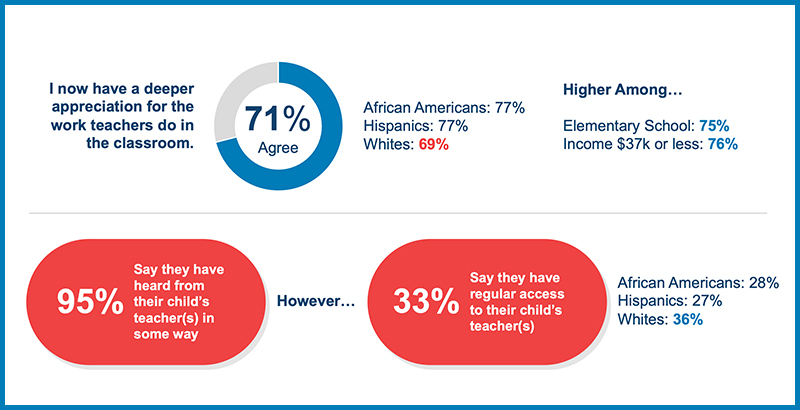Analysis: Safety, Trust, High Expectations — How Families & Teachers Can Work Together So This Isn’t a Lost Year for Students

School closures driven by COVID-19 saw parents and teachers step up in many new ways last spring. Unlike much of the public narrative, our research has shown that parents are proud of their efforts during the spring closures. We heard, “We got this,” and “It was hard, but we did it.” Parents were engaged in their children’s learning like never before.
The question is: Will parents continue engaging in this way, and will educators capture this level of engagement to put systems in place that facilitate meaningful collaboration between parents and teachers?
We face a double whammy — while teachers readily acknowledge that many, if not all, students will have to make up for lost academic ground from school closures, parents do not believe, based on our research, that their children are behind academically.
We were initially surprised by this contradiction. Every district had a different approach to distance learning. Many teachers reported not being able to connect with their students. Education inequities that have been locked in for decades became visible for all to see, as children in high-poverty districts reported having the lowest-quality experience, compounded by limited access to internet and technology.
But after hearing more in this year’s longitudinal survey on parent mindsets, we understand. Parents believe that their children are not behind because schooling stopped on the same day and everyone will pick back up at the start of the new school year. An eye-popping 92 percent of parents — regardless of race, income and education level — reported that their child is at or above grade level in reading and math. This is 2 percentage points higher than in our previous four years’ worth of tracking data on this question. Yet, results of the National Assessment of Educational Progress suggest that just over one-third of children perform at that level. Nationally, just above one-third of students were at or above proficiency on the National Assessment of Educational Progress when you average fourth-, eighth- and 12th-grade performance.
Throughout the summer, Learning Heroes conducted more than 11 focus groups with parents and guardians around the country to gain a deeper understanding of their experiences and perspectives educating their children in a COVID-19 world. A few insights emerged:
Safety is the dominant driver in decision-making, with social and emotional well-being a clear second. As parents grapple with their children returning to school, concerns about academics come in a distant third.
Trust is paramount to reopening. If parents did not trust the school to serve their children pre-COVID, the bar is much higher now. African-American parents especially expressed this concern, one parent saying that the school could not “keep soap in the soap dispenser pre-COVID, so what makes me feel like they can deliver now?” Additionally, parents do not trust other parents to keep their children home if they have symptoms, largely due to the absence of a backup plan.
The grace period is over. Parents have high expectations for this school year and want teachers to be in charge. Parents say they are eager to be “allies” in partnership with their children’s teachers, but they do not want to take responsibility for academics or to be seen as a co-teacher. Parents seek more from teachers: Overall, 73 percent want a better understanding of what their child is expected to learn, 69 percent want a better understanding of where their child is academically, and 60 percent report they will deepen their relationship with their child’s teacher. African-American and Latino families prioritize these actions even more.
There are key ways parents and teachers can work together as allies to ensure a successful school year.
Make sure parents know their children’s academic starting point and are co-creators in a 2020 learning plan. This year’s parent-teacher conference takes on new meaning. Teachers can share beginning-of-the-year assessment data with parents and students, alongside clear learning expectations and an opportunity for parent and student feedback. At Learning Heroes, we developed a consumer-tested parent-teacher engagement tool to facilitate this partnership.
Principals and teachers can ask parents about their children’s academic and social-emotional strengths and weaknesses. As observers, parents can provide a window into their children that will be critical for teachers to be able to do their job as successfully as possible.
Establish a robust communication protocol. Schools will already have strategies for communicating COVID test results, but parents also want to know how they can discuss social and emotional growth and academics. A clear, predictable plan can respect both teachers’ and parents’ time.
This year will be like no other. Uniting parents and teachers around student learning can ensure that this isn’t a lost year but a year of enduring innovation.
Bibb Hubbard is the founder and president of Learning Heroes, an organization that connects parents to useful information and simple actions they can take to help their child thrive in school and life. Cindi Williams is a co-founder of Learning Heroes and a principal at HCM Strategists, leading the K-12 practice. She previously served as a senior leader at the Bill & Melinda Gates Foundation, as well as the White House and the U.S. Department of Education under President George W. Bush.
Get stories like these delivered straight to your inbox. Sign up for The 74 Newsletter

;)
